Joseph Calleia
Joseph Calleia (/kəˈleɪə/ kə-LAY-ə; born Joseph Alexander Caesar Herstall Vincent Calleja, August 4, 1897 – October 31, 1975) was a Maltese-born American actor and singer on the stage and in films, radio and television.
Joseph Calleia | |
|---|---|
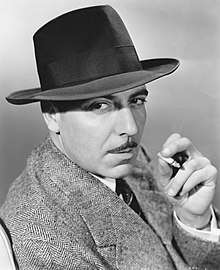 Joseph Calleia in 1942 | |
| Born | Joseph Alexander Caesar Herstall Vincent Calleja August 4, 1897 |
| Died | October 31, 1975 (aged 78) |
| Other names |
|
| Occupation |
|
| Years active | 1918–1963 |
| Spouse(s) | Eleanor Vassallo (married 1929–1967) |
After serving in the British Transport Service during World War I he travelled to the United States and began his career on the stage, initially in musical comedy, but later in original Broadway productions as Broadway (1926), The Front Page (1928), The Last Mile (1930), and Grand Hotel (1930). Calleia became a star with the play Small Miracle (1934), his first real role as a heavy, and he was put under contract by Metro-Goldwyn-Mayer.
Calleia excelled as the villain in Hollywood films, but he fought against typecasting and created a succession of darkly mysterious characters edged with humor in films including Algiers (1938), Five Came Back (1939), Golden Boy (1939), The Glass Key (1942) and Gilda (1946). During World War II Calleia led the Malta War Relief organization in the US, and toured for the USO and the Hollywood Victory Committee. After the war he continued to work steadily in motion pictures and television, and he starred in the 1948 London stage premiere of Arthur Miller's Tony Award-winning play, All My Sons. Calleia's performance in Orson Welles's 1958 film Touch of Evil is regarded as one of the best in his career.
Biography
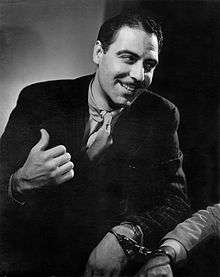
Joseph Alexander Caesar Herstall Vincent Calleja[1][2][lower-alpha 1] was born August 4, 1897,[4] in Notabile (now called Mdina),[4][5] in the administrative area of Saqqajja,[lower-alpha 2] in the Crown Colony of Malta. His parents were Pasquale and Eleonore Calleja;[6] his father was an architect.[7] Calleia studied at St. Julian's and St. Aloysius Colleges. At age 12 he used the English pound given to him for Christmas to buy two dozen harmonicas, and organized a local band whose performances were soon netting £100 a week. Sent by his father to London to study engineering, Calleia employed his good tenor voice in music halls, performing ballads of the Scottish Highlands in traditional dress. He worked as Joseph Spurin, using his mother's maiden name due to his father's disapproval.[1]
In 1914 Calleia joined the British Transport Service. After cruising the world for two-and-a-half years, his ship was torpedoed in the English Channel. Hospitalized for three months,[8] Calleia was awarded a campaign medal[9] and honorably discharged. He traveled to the United States in 1917.[8] Unemployed,[10] he sang for the Red Cross and armed services, and volunteered for the American Tank Corps.[8]
Calleia began his stage career on Armistice Day.[11] After World War I he found only limited success in vaudeville. He earned his living stoking the furnace at a department store, and got a night job washing and repairing New York City streetcars. By day he haunted theatrical booking offices.[12] The Henry W. Savage agency sent Calleia to Denver, where he made his stage debut singing in the chorus of Jerome Kern's musical comedy Have a Heart.[1][8] The following season he had a bit part in Pietro (1920), an Otis Skinner vehicle that played six weeks on Broadway and 40 weeks on tour. Calleia supplemented his salary by working as assistant stage manager and repairing trunks at $3 each.[1]
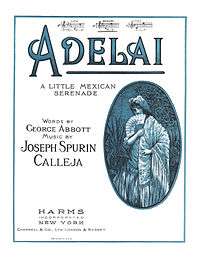
Calleia's first speaking role on the stage was in The Broken Wing (1920), a Broadway comedy starring George Abbott and Louis Wolheim. He understudied all of the parts and appeared as a Mexican peon[1] who played the guitar and sang a song called "Adelai".[12] Calleia composed the tune, and asked Abbott to write the lyrics; the song was published and eventually brought each of them royalties of as much as $2,000 a year.[13]
The Broken Wing was a hit,[13] and after the play's New York run Calleia and Thurston Hall were carried over in a London production. After four months the show closed and Calleia visited Malta, where he and his father reconciled. At his father's request he began using his real surname, and was billed as Joseph Spurin-Calleia.[1][14]
On February 14, 1925, Calleia made his concert debut at Town Hall in New York City, accompanied by pianist Ferdinand Greenwald. "He proved to be the possessor of an agreeable high voice, which he used with much skill in Italian airs," wrote New York Times music critic Olin Downes, "including that of Rodolfo from Puccini's La Boheme and others from Verdi's Trovatore and Rigoletto."[15] In recital at New York's Steinway Hall on February 21, 1926, Calleia "displayed a voice of pleasant and attractive timbre" in a program that included works by Scarlatti, Paisiello, Schumann, Gounod and Leoncavallo, as well as two of his own compositions.[16]
Calleia was cast as the Spanish ambassador in the Broadway production of Princess Flavia (1925),[1] Sigmund Romberg's musical adaptation of The Prisoner of Zenda. While he was waiting for the elaborate production to be mounted he sold pianos, with such success that the store owner offered him a store of his own if he would stay.[12]
In 1926 Calleia was given his first prominent stage role, in George Abbott and Philip Dunning's smash hit, Broadway.[12][17] He played a shuffling, coin-jingling waiter[18] in the melodrama that New York Times critic Brooks Atkinson later called a "noisy, bustling cyclorama of backstage life [that] remains a landmark in the American theater."[19] Calleia also acted as the company's stage manager and, working for producer Jed Harris, he supervised some ten duplicate productions of Broadway in the US and abroad.[20]
A succession of acclaimed performances in successful Broadway plays followed, including a shiftless newspaper reporter in The Front Page (1928), a convicted murderer in The Last Mile (1930), and the sinister chauffeur in Grand Hotel (1930).[12] Calleia became a star with Small Miracle (1934), a Broadway production described by The New Yorker as "a very satisfactory melodrama with Joseph Spurin-Calleia as the pleasantest murderer you ever saw."[21]
.jpg)
"What an actor—Joseph Calleia", said Orson Welles, who directed and performed with Calleia in Touch of Evil (1958):
I fell in love with him as a ten-year-old boy. I saw him in a play in New York[lower-alpha 3] ... a very well-staged melodrama which was an enormous hit for about a year—it was made as a movie later with somebody else. He had the leading role, and I never forgot him. And through the years I'd seen him in movies—little things. And I could never forget that performance of his. He's always played very stereotyped parts in pictures but is one of the best actors I've ever known. I have such respect for him. You play next to him and you just feel the thing that you do with a big actor—this dynamo going on.[23]:298
Naming the theatre's villain of the year for 1934, nationally syndicated columnist Paul Harrison of the Newspaper Enterprise Association selected "Joseph Spurin-Calleia, whose gangster role in Small Miracle provided one of the finest of all performances on Broadway."[24]
Calleia had his first real role as a heavy in Small Miracle, and his success in the play was responsible for his move to Hollywood.[25] Calleia's contract with Metro-Goldwyn-Mayer permitted him a hiatus of six months a year, to continue his stage work.[26] He was not new to motion pictures—he had made three feature films on the East Coast[27]—but when MGM put Calleia under contract they promoted his first film, Public Hero No. 1 (1935), as his screen debut.[28] Calleia's portrayal of the gunman was listed by film critic Andre Sennwald of The New York Times as one of the year's ten best male performances.[29][30]
Calleia excelled as the villain in films, but he wanted to create characters with some sympathy. "I'd like to get away from straight villain roles," he said in a 1936 interview. "But I have no wish to be a hero. I enjoy roles where I get slapped around a bit. It's far more stimulating to play a character that isn't all one thing—not all bad and not all good."[25] He created a series of darkly mysterious characters edged with humor in films including Algiers (1938), Five Came Back (1939), Golden Boy (1939), The Glass Key (1942) and Gilda (1946).[2][31]
In June 1935 Calleia was announced to star as Joaquin Murrieta in I Am Joaquin[32] (later titled Robin Hood of El Dorado), a film for which he had written the screenplay. MGM replaced him with Warner Baxter, ostensibly because Calleia was too old, although Baxter was six years older.[33] Calleia did receive a starring role in Man of the People (1937), a political drama about a young lawyer fighting corporate racketeers.[34]
Calleia continued to battle typecasting, turning down well-paying villainous roles to develop more complex characters.[35] His performance as police inspector Slimane in Walter Wanger's Algiers (1938) was recognized by the National Board of Review.[22] Working with director John Farrow at RKO Pictures in 1939, he created a fine character study as the condemned anarchist in Five Came Back,[36] and portrayed a heroic priest in Full Confession. Calleia was announced to star as Father Damien in an RKO picture to be written and directed by Farrow,[35][37][38] but the project was not realized.
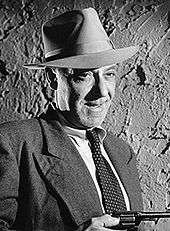
Calleia became a naturalized citizen of the United States in November 1941.[4] During World War II, Calleia led the Malta War Relief organization in the US. The house where he was born was destroyed in 1942; his family took refuge underground, in ancient catacombs, during the near-constant aerial bombing of Malta by the Axis powers that continued for more than two years.[5] Under the auspices of the Motion Picture Division of USO Camp Shows, he made personal appearances at US military facilities in 1943.[39] He also accepted an invitation from the Hollywood Victory Committee to make a tour of military camps in North Africa, particularly because the tentative itinerary included Malta. On the 20,000-mile trip Calleia and his small troupe entertained service personnel in Natal, Dakar, along the coast to Casablanca and across to Tunis before going to Malta, which Calleia had not visited since 1922. They gave two shows a day and visited all of the hospitals at each stop; and they presented six shows in Malta as part of the exchange program between US and British entertainment units.[40][lower-alpha 4]
In addition to working steadily in motion pictures for another 20 years,[27] Calleia also starred in the 1948 London stage premiere of Arthur Miller's Tony Award-winning play All My Sons, receiving unanimous critical acclaim.[41] His performance in Touch of Evil (1958)—as Pete Menzies, longtime partner of corrupt police captain Hank Quinlan (Orson Welles)—is regarded as one of the best of his career.[42][43][44]
"It is not rare in Welles's films for one actor to break away from the overall gesture of the film to embody a distilled human truth," wrote Welles biographer Simon Callow. "In Touch of Evil there are two actors who do this—Dietrich and Joseph Calleia, playing Quinlan's deceived colleague, Menzies. Calleia's haunted features figure more and more prominently on screen as the truth about Quinlan increasingly dawns on him, along with the knowledge that he must betray him. ... Calleia's abundant inner life casts a growing spell over the film as it comes to its climax, bringing to vividly personal life Welles's sempiternal subject: betrayal."[45]
Calleia retired in 1963 to Sliema, Malta.[6] His wife, Eleanor Vassallo Calleia, whom he had married in 1929, died there in 1967.[lower-alpha 5] Calleia died October 31, 1975, aged 78, in St. Julian's. He was interred in the family vault at Santa Maria Addolorata Cemetery in Paola.[47]
Theatre credits

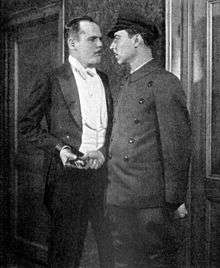
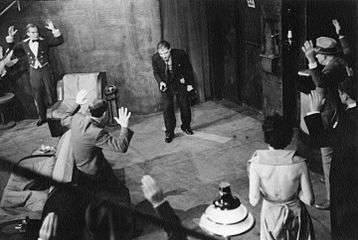
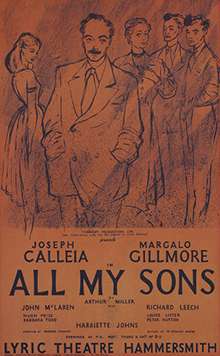
| Date | Title | Role | Notes |
|---|---|---|---|
| 1919 | Have a Heart[lower-alpha 6] | Chorus member | Joins touring company in Denver[1][12][49] |
| January 19 – March 1, 1920 | Pietro | Miguel | Criterion Theatre, New York[1][50][51] |
| 1920 | Pietro | Miguel | Also assistant stage manager 40-week national tour[1] |
| November 29, 1920 – April 1, 1921 | The Broken Wing | Basilio | 48th Street Theatre, New York[1][52][53] |
| August 15 – November 18, 1922 | The Broken Wing | Basilio | Duke of York's Theatre, London[1][12][54] |
| April 9 – June 1, 1923 | Zander the Great | Juan | Empire Theatre, New York[55][56] |
| November 2, 1925 – March 13, 1926 | Princess Flavia | Senor Poncho, Wurfner | Century Theatre and (from February 1) Shubert Theatre, New York[57][58][59] |
| September 16, 1926 – February 11, 1928 | Broadway | Joe | Broadhurst Theatre, New York[60][61] Also stage manager; also in charge of some ten duplicate productions of the play in the U.S. and abroad[1][18][20] |
| August 14, 1928 – April 13, 1929 | The Front Page | Kruger, Journal of Commerce | Times Square Theater, New York[62][63] |
| February 13 – October 1, 1930 | The Last Mile | Tom D'Amoro | Sam H. Harris Theatre, New York[64][65] |
| November 13, 1930 – December 5, 1931 | Grand Hotel | Chauffeur | Also general stage manager National Theatre, New York[66][67] |
| September 14 – December 3, 1932 | Clear All Wires | — | Stage manager Times Square Theatre, New York[1][68] |
| December 23, 1932 – February 1, 1933 | Honeymoon | Nicola | Little Theatre, New York[69][70] |
| October 17 – December 30, 1933 | Ten Minute Alibi | Hunter | Ethel Barrymore Theatre, New York[71][72] |
| July 9, 1934 | The Bride of Torozko | Westport Country Playhouse, Westport, Connecticut[73] | |
| September 26, 1934 – January 5, 1935 | Small Miracle | Tony Mako | John Golden Theatre and (from November 11) 48th Street Theatre, New York[74][75] |
| February 7 – February 1935 | Small Miracle | Tony Mako | El Capitan Theatre, Hollywood, produced by Henry Duffy with original cast members Robert Middlemass and Joseph King[76][77][78] |
| May 11 – September 18, 1948 | All My Sons | Joe Keller | Lyric Theatre and (from June 15) Globe Theatre, London, with Margalo Gillmore[79][80] |
| January 1955 | All My Sons | Joe Keller | Alley Theatre, Houston[81] |
Filmography
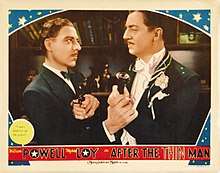
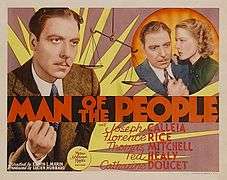
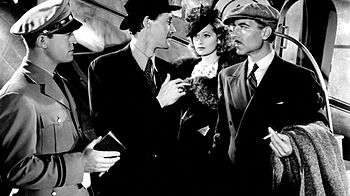
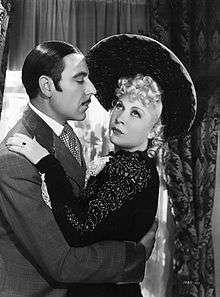
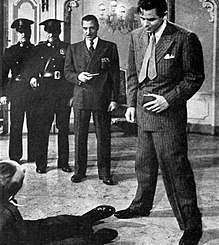
| Year | Title | Role | Notes |
|---|---|---|---|
| 1931 | My Sin | Juan | [27] |
| 1931 | His Woman | Agent | [27] |
| 1932 | The Divorce Racket | Stephen Arnaud | [27] |
| 1935 | Public Hero#1 | Sonny Black | [27] |
| 1936 | Riffraff | Nick Lewis | [27] |
| 1936 | Exclusive Story | Ace Acello | [27] |
| 1936 | Tough Guy | Joe Calerno | [27] |
| 1936 | Robin Hood of El Dorado | — | Screenwriter[82] |
| 1936 | His Brother's Wife | Fish-Eye | [27] |
| 1936 | Sworn Enemy | Joe Emerald | [27] |
| 1936 | Sinner Take All | Frank Penny | [27] |
| 1936 | After the Thin Man | "Dancer" | [27] |
| 1937 | Man of the People | Jack Moreno | [27] |
| 1937 | The Bad Man of Brimstone | Portuguese Ben | [27] |
| 1938 | Algiers | Inspector Slimane | National Board of Review Award[22][27] |
| 1938 | Marie Antoinette | Drouet | [27] |
| 1939 | Juarez | Alejandro Uradi | [27] |
| 1939 | The Gorilla | Stranger | [27] |
| 1939 | Five Came Back | Vasquez | [27] |
| 1939 | Golden Boy | Eddie Fuseli | [27] |
| 1939 | Full Confession | Father Loma | [27] |
| 1940 | My Little Chickadee | Jeff Badger | [27] |
| 1940 | Wyoming | John Buckley | [27] |
| 1941 | The Monster and the Girl | Deacon | [27] |
| 1941 | Sundown | Pallini | [27] |
| 1942 | The Jungle Book | Buldeo | [27] |
| 1942 | The Glass Key | Nick Varna | [27] |
| 1943 | For Whom the Bell Tolls | El Sordo | [27] |
| 1943 | The Cross of Lorraine | Antonio Rodriguez | [27] |
| 1944 | The Conspirators | Captain Pereira | [27] |
| 1946 | Deadline at Dawn | Val Bartelli | [27] |
| 1946 | Gilda | Det. Maurice Obregon | [27] |
| 1947 | The Beginning or the End | Enrico Fermi | [27] |
| 1947 | Lured | Dr. Moryani | [27] |
| 1948 | The Noose Hangs High | Mike Craig | [27] |
| 1948 | Four Faces West | Monte Marquez | [27] |
| 1948 | Noose | Sugiani | U.S. title The Silk Noose[83][84] |
| 1950 | Captain Carey, U.S.A. | Dr. Lunati | [27] |
| 1950 | The Palomino | Miguel Gonzales | [27] |
| 1950 | Branded | Mateo Rubriz | [27] |
| 1950 | Vendetta | Guido Barracini | [27] |
| 1951 | Valentino | Luigi Verducci | [27] |
| 1951 | Pulitzer Prize Playhouse | Don Fernando | Episode: "Night Over Taos"[85] |
| 1951 | The Light Touch | Lt. Massiro | [27] |
| 1952 | When in Rome | Aggiunto Bodulli | [27] |
| 1952 | Yankee Buccaneer | Count Domingo Del Prado | [27] |
| 1952 | The Iron Mistress | Juan Moreno | [27] |
| 1953 | The Caddy | Papa Anthony | [27] |
| 1955 | Underwater! | Rico Herrera | [27] |
| 1955 | The Treasure of Pancho Villa | Capt. Pablo Morales | [27] |
| 1955 | The Littlest Outlaw | The Padre | [27] |
| 1956 | Hot Blood | Papa Theodore Caldash | [27] |
| 1956 | Serenade | Maestro Marcatello | [27] |
| 1957 | Wild Is the Wind | Alberto | [27] |
| 1958 | Touch of Evil | Pete Menzies | [27] |
| 1958 | The Light in the Forest | Chief Cuyloga | [27] |
| 1958 | Have Gun – Will Travel | Sheriff Sam Truett | Episode: "The Manhunter"[86] |
| 1959 | Zorro | Padre Simeon | Episode:"The Sergeant Sees Red"[87][88] |
| 1959 | Cry Tough | Papa Estrada | [27] |
| 1960 | The Alamo | Juan Seguín | [27] |
| 1963 | Johnny Cool | Tourist | [27] |
| 1963 | Bob Hope Presents the Chrysler Theatre | Cagewa | Episode:"A Killing at Sundial"[89][90] |
Select radio credits
| Date | Title | Role | Notes |
|---|---|---|---|
| March 2, 1939 | Kraft Music Hall | Guest star | Calleia sings "Adelai", the popular song he and George Abbott wrote for Broadway's The Broken Wing (1920–21)[91] |
| February 25, 1940 | The Screen Guild Theater | Hal Wilson | "Blind Alley" with Edward G. Robinson[92][93][94] |
| November 12, 1943 | Stage Door Canteen | Guest star | [95] |
| February 18, 1944 | Stage Door Canteen | Guest star | [95] |
| November 24, 1944 | Stage Door Canteen | Guest star | [95] |
| November 7, 1948 | Theatre Guild on the Air | "Criminal Code" with Pat O'Brien[96] |
Legacy
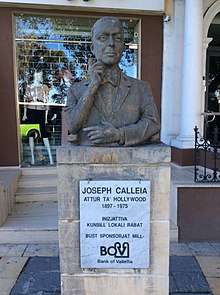
Calleia was posthumously honored by the Malta postal authority with a set of two commemorative stamps issued in 1997.[6][97][98] In 2005, a bust of Calleia by sculptor Anton Agius was installed at his birthplace in Malta on the initiative of then 15-year-old Eman Bonnici.[6][99][100]
Notes
- Calleia's surname is pronounced "cal-ay-a", with the emphasis on the second syllable.[3]
- Saqqajja is an administrative area of Mdina but outside the walled city. It is culturally considered part of both Rabat and Mdina. Saqqajja was historically part of Rabat but in recent history is officially part of Mdina; see also Melite (ancient city).
- The play, titled Small Miracle, ran on Broadway in 1934–35 and was filmed in 1935 as Four Hours to Kill!, starring Richard Barthelmess.
- Calleia's USO troupe consisted of singer Marcia Rice, accordionist Bonnie Brooks, and master of ceremonies Gary Webb. Calleia sang, performed a scene from Small Miracle—"and I closed the show with a burlesque striptease. That was the toughest part of the show. It gets awful cold in North Africa."[40]
- Joseph Calleia and Eleanor Vassallo (born August 19, 1898, Brooklyn, N.Y.) were married December 29, 1929, at Long Island, N.Y. She died in Sliema, Malta, on December 17, 1967.[4][46]
- Written by Guy Bolton and P. G. Wodehouse with music by Jerome Kern, Have a Heart was first produced on Broadway in 1917 by Harry W. Savage.[48]
References
- "Across from Malta". The New York Times. October 21, 1934. Retrieved 2015-11-11.
- Katz, Ephraim (1998). The Film Encyclopedia (3rd ed.). New York: HarperPerennial. p. 208. ISBN 0-06-273492-X.
- York, Cal (December 1939). "Cal York's Gossip of Hollywood; Pronouncing Guide". Photoplay. Vol. 53 no. 12. p. 70. Retrieved 2016-01-04.
- The National Archives at Riverside; Riverside, California, USA; Petitions for Naturalization, U.S. District Court for the Central District of California (Los Angeles), 1940–1991; NAI: 594890; Record Group Title: Records of District Courts of the United States, 1685–2009; Record Group Number: 21. Ancestry.com, California, Naturalization Records, 1887–1991 [database online]. Provo, Utah: Ancestry.com Operations Inc., 2014. Retrieved 2015-11-11.
- "Film Actor Heads Malta War Relief". Pittsburgh Press. November 22, 1942. Retrieved 2015-11-13.
- "Joseph Calleia - Malta's Hollywood actor". The Malta Independent. May 21, 2013. Retrieved 2016-09-09.
- "Joseph Calleia's Father Dies". The New York Times. July 4, 1945. Retrieved 2015-11-11.
- "The Front Page". Playbill. October 1, 1928. p. 47. Retrieved 2016-11-29.
- "Joseph Calleia". Ancestry.com. Web: UK, Campaign Medals Awarded to WWI Merchant Seamen, 1914–1925 [database on-line]. Provo, UT, USA: Ancestry.com Operations, Inc., 2014. Retrieved 2015-11-11.
- "Joseph Calleia Spurin". Ancestry.com. U.S., World War I Draft Registration Cards, 1917–1918 [database on-line]. Provo, UT, USA: Ancestry.com Operations, Inc., 2005. Retrieved 2015-11-11.
- The Broken Wing (The Magazine Theatre Program). 48th Street Theatre, New York: New York Theatre Program Corporation. March 21, 1921. p. 23.CS1 maint: location (link)
- Weiler, A. H. (November 21, 1943). "A True Chip Off the Old Maltese Block". The New York Times. Retrieved 2015-11-11.
- Abbott, George (1963). Mister Abbott. New York: Random House. p. 99. OCLC 330940.
- "Double Jointed Film Name Has Unusual Story". Chicago Tribune. April 28, 1935. Retrieved 2016-01-16.
- Downes, Olin (February 15, 1925). "Opera: Joseph Calleia, Tenor, in Debut". The New York Times. Retrieved 2015-11-20.
- "Joseph Calleia, Tenor, Pleases". The New York Times. February 22, 1926. Retrieved 2015-11-20.
- Berger, Marilyn (February 2, 1995). "George Abbott, Broadway Giant With Hit After Hit, Is Dead at 107". The New York Times. Retrieved 2015-11-21.
- "A Solid Year of Broadway". The New York Times. September 18, 1927. Retrieved 2015-11-21.
- Berger, Marilyn (July 22, 1968). "Philip Dunning, Playwright, 76, Co-Author of 'Broadway,' Dies". The New York Times. Retrieved 2015-11-21.
- "Plan 10 Companies to Act 'Broadway'". The New York Times. March 22, 1927. Retrieved 2015-11-21.
- "Goings On About Town". The New Yorker. X (46): 2. December 29, 1934.
- "The Year's Best". National Board of Review Magazine. National Board of Review. 14 (1): 12. January 1939. Retrieved 2015-11-15.
- Welles, Orson, and Peter Bogdanovich, edited by Jonathan Rosenbaum, This is Orson Welles. New York: HarperCollins Publishers 1992 ISBN 0-06-016616-9.
- Harrison, Paul (December 30, 1934). "Variety of Broadway Plays Are Listed Among Dying Year's Best Stage Fare". The Pittsburgh Press.
- "Amusements". Somerset Daily American. Somerset, Pennsylvania. September 8, 1936. p. 5.
- "Coming and Going". The Film Daily. January 15, 1936. Retrieved 2016-09-17.
- "Joseph Calleia". AFI Catalog of Feature Films. American Film Institute. Retrieved 2015-11-12.
- Public Hero No. 1 trailer. Internet Archive. 1935. Event occurs at 0:15.
- Sennwald, Andre (January 5, 1936). "Best Ten, More or Less". The New York Times. Retrieved 2015-11-16.
- Sennwald, Andre (June 8, 1935). "Movie Review: Public Hero No. 1". The New York Times. Retrieved 2015-11-16.
- Halliwell, Leslie (1984) [1965]. Halliwell's Filmgoer's Companion (8th ed.). New York: Charles Scribner's Sons. p. 103. ISBN 0-684-18183-5.
- "Screen Notes". The New York Times. June 11, 1935. Retrieved 2016-09-17.
- "Robin Hood of El Dorado". AFI Catalog of Feature Films. American Film Institute. Retrieved 2016-09-17.
- "Has New Type Picture Role; Joseph Calleia The Hero of 'Man of the People', at Queen". Big Spring Daily Herald. April 16, 1937.
- Coons, Robbin (July 24, 1939). "Hollywood Sights and Sounds". Big Spring Daily Herald.
- Soanes, Wood (July 9, 1939). "Unusual Film Fare Offered This Week". Oakland Tribune.
Out of the enterprise comes a fine piece of work by Joseph Calleia, an actor who was taken from the stage after several excellent characterizations and who has been given little chance to show his stuff on the screen. Because Five Came Back was obviously not viewed as an epic while in the making and was, consequently, not subjected to high-powered studio supervision, Calleia managed to get in a splendid character study.
- "'Damien the Leper' Purchased by RKO; Robert Sisk to Be the Producer — Joseph Calleia Has Been Assigned to Title Role". The New York Times. May 17, 1939. Retrieved 2016-09-17.
- "Hollywood Buys 45 More Stories to Add to 1940 Feature Programs". Motion Picture Herald. 136 (1): 34. July 1, 1939. Retrieved 2016-09-17.
- "Movie Actor Visitor at Local Post". Big Spring Herald. September 14, 1943.
- Soanes, Wood (March 25, 1944). "Malta's Gift to Films, Joseph Calleia, Cheers Up His Blitzed Brothers and Yanks in North Africa". Oakland Tribune.
- "'All My Sons' a Hit". The New York Times. May 12, 1948. Retrieved 2016-09-18.
- Comito, Terry, ed. (1998) [1985]. "Interview with Charlton Heston". Touch of Evil. Rutgers University Press. p. 215. ISBN 0-8135-1097-X.
There were some fine performances, especially Joe Calleia. I think it's one of the very best pieces of work he did in his whole career.
- Brady, Frank (1989). Citizen Welles: A Biography of Orson Welles. New York: Charles Scribner's Sons. p. 500. ISBN 0-385-26759-2.
- McGilligan, Patrick (2015). Young Orson. New York: Harper. p. 297. ISBN 978-0-06-211248-4.
- Callow, Simon (2015). Orson Welles: One Man Band. New York: Viking. pp. 255–256. ISBN 978-0-670-02491-9.
- National Archives and Records Administration (NARA), Washington, D.C.; General Records of the Department of State; Record Group: RG59-Entry 5166; Box Number: 51; Box Description: 1968 BI - CAZ. Ancestry.com. Reports of Deaths of American Citizens Abroad, 1835–1974 [database online]. Provo, Utah: Ancestry.com Operations Inc., 2010. Retrieved 2015-11-22.
- "Joseph Calleia". Find a Grave. Retrieved 2016-09-09.
- "Have a Heart". Internet Broadway Database. Retrieved 2015-11-12.
- "It Pleased in Denver". The Hutchinson News. February 12, 1919.
- "Pietro". Playbill Vault. Playbill. Retrieved 2015-11-12.
- "Pietro". Internet Broadway Database. Retrieved 2015-11-12.
- "The Broken Wing". Internet Broadway Database. Retrieved 2015-11-12.
- "The Broken Wing". Playbill Vault. Playbill. Retrieved 2015-11-12.
- Wearing, J. P. (2014). The London Stage 1920–1929: A Calendar of Productions, Performers, and Personnel. Lanham, Maryland: Rowman & Littlefield. p. 179. ISBN 978-0-8108-9302-3.
- "Zander the Great". Internet Broadway Database. Retrieved 2015-11-12.
- "Zander the Great". Playbill Vault. Playbill. Retrieved 2015-11-12.
- "Princess Flavia". Internet Broadway Database. Retrieved 2015-11-12.
- "Princess Flavia". Playbill Vault. Playbill. Retrieved 2015-11-12.
- "'Princess Flavia' is Rich and Captivating". The New York Times. Retrieved 2015-11-21.
- "Broadway". Internet Broadway Database. Retrieved 2015-11-12.
- "Broadway". Playbill. Retrieved 2016-11-29.
- "The Front Page". Playbill. October 1, 1928. p. 37. Retrieved 2016-11-29.
- "The Front Page". Internet Broadway Database. Retrieved 2015-11-12.
- "The Last Mile". Internet Broadway Database. Retrieved 2015-11-12.
- "The Last Mile". Playbill Vault. Playbill. Retrieved 2015-11-12.
- "Grand Hotel". Internet Broadway Database. Retrieved 2015-11-12.
- "Grand Hotel". Playbill Vault. Playbill. Retrieved 2015-11-12.
- "Clear All Wires". Playbill Vault. Playbill. Retrieved 2015-11-12.
- "Honeymoon". Internet Broadway Database. Retrieved 2015-11-12.
- "Honeymoon". Playbill Vault. Playbill. Retrieved 2015-11-12.
- "Ten Minute Alibi". Internet Broadway Database. Retrieved 2015-11-12.
- "Ten Minute Alibi". Playbill Vault. Playbill. Retrieved 2015-11-12.
- "'Bride of Torozko' Scores at Opening". The New York Times. July 10, 1934. Retrieved 2015-11-17.
- "Small Miracle". Internet Broadway Database. Retrieved 2015-11-12.
- "Small Miracle". Playbill Vault. Playbill. Retrieved 2015-11-12.
- "News of the Stage". The New York Times. February 8, 1935. Retrieved 2016-01-16.
- Hart, Enid (February 15, 1935). "Theatrical Chi-Chat". The San Marino Tribune.
Mr. Spurin-Calleia justifies the advance news of his ability. The rest of the cast also is first class. Small Miracle should have a record run.
- Soanes, Wood (February 22, 1935). "Curtain Calls". Oakland Tribune.
Spurin-Calleia ... has started a run for Henry Duffy at El Capitan in his original role in Small Miracle.
- "'All My Sons' a Hit". The New York Times. May 12, 1948. Retrieved 2015-11-26.
- Wearing, J. P. (2014). The London Stage 1940–1949: A Calendar of Productions, Performers, and Personnel. Lanham, Maryland: Rowman & Littlefield. p. 368. ISBN 978-0-8108-9306-1.
- Parson, Louella O. (January 27, 1955). "Louella Parsons in Hollywood". The Indianapolis Star. International News Service. Retrieved 2016-09-09.
- "Robin Hood of El Dorado". AFI Catalog of Feature Films. American Film Institute. Retrieved 2015-11-12.
- "The Silk Noose". Internet Movie Database. Retrieved 2015-11-13.
- "Noose (1948)". British Film Institute. Archived from the original on 2012-07-11. Retrieved 2015-11-13.
- "Night Over Taos". Pulitzer Prize Playhouse. Internet Movie Database. Retrieved 2015-11-13.
- "The Manhunter". Have Gun — Will Travel. Internet Movie Database. Retrieved 2015-11-13.
- "The Sergeant Sees Red". Zorro. Internet Movie Database. Retrieved 2015-11-13.
- "Zorro, Season Two". Classic Television Archive. Retrieved 2015-11-13.
- "A Killing at Sundial". Bob Hope Presents the Chrysler Theatre. Internet Movie Database. Retrieved 2015-11-13.
- "Bob Hope Presents the Chrysler Theatre, Season One". Classic Television Archive. Retrieved 2015-11-13.
- "Ethel Waters and Joe Cook Will be Guests of Vallee; Crosby Signs Joan Bennett and Joseph Calleia". The Lima News. March 2, 1939.
Joan Bennett and Joseph Calleia, heroine and villain of many cinema productions ... are the visiting celebrities in the Music Hall with Bing Crosby ...
- "The Gulf Screen Guild Theatre". RadioGOLDINdex. Retrieved 2015-11-16.
- "Screen Guild Theater". Internet Archive. Retrieved 2015-11-16.
- "Sunday Caller". Harrisburg Telegraph. February 24, 1940. p. 17. Retrieved 2015-11-16 – via Newspapers.com.

- "Stage Door Canteen". Jerry Haendiges Vintage Radio Logs. Retrieved 2015-11-26.
- "Theatre Guild on the Air". Digital Deli Too. Retrieved 2015-11-26.
- "Anniversaries 1997 - 6c Joseph Calleia and film reel". Malta Post. Retrieved 2015-11-10.
- "Anniversaries 1997 - 6c Joseph Calleia and film camera". Malta Post. Retrieved 2015-11-10.
- "Letters: Calleia's bust vandalised". Times of Malta. February 12, 2006. Retrieved 2017-02-11.
- "Letters: Bust of Joseph Calleia". Times of Malta. July 15, 2007. Retrieved 2017-02-11.
External links
| Wikimedia Commons has media related to Joseph Calleia. |